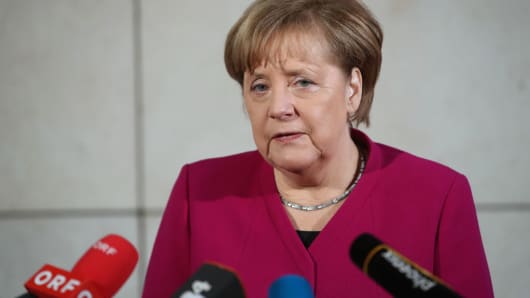German leader Merkel says the current world order is under threat
German leader Angela Merkel said that multilateralism was under threat and said that protectionism is not the answer to the world's problems.
"Frankly speaking, the country I have the honor to represent and where I am chancellor has difficulties. And polarization is something that we see in our country as well, which we haven't had for decades," Merkel said.
She attributed increasing populism and polarization to both the euro zone crisis and migration crisis seen in Europe over the last few years following an influx of refugees but said Germany would not shrink from the world stage.
"Germany wishes to be a country that lends its contribution in the future to solve the problems of the world together, we think that shutting ourselves off and isolating ourselves will not lead us into a good future. Protectionism is not the proper answer," she said.
Merkel is just the latest leader at Davos to criticize a protectionist and isolationist stance towards the world's problems. Such comments appear to be directed towards President Donald Trump who has adopted an "America First" stance in his foreign and economic policies.
Merkel's comments also come amid continued speculation over Germany, and indeed Merkel's, political future after months of negotiations aimed at forming a coalition government. This after no one party gained a majority in last September's election.
Merkel's conservative alliance of the Christian Democratic Union (CDU) and Christian Social Union (CSU) first attempted to form a coalition with the Green party and pro-business Free Democratic Party (FDP), but it failed after the parties couldn't agree on various policies ranging from immigration to euro zone integration.

Sean Gallup | Getty Images
German Chancellor Angela Merkel speaks at the headquarters of SPD for preliminary coalition talks on January 7, 2017.
With no prospect of an alliance, Merkel's coalition partner in several former governments, the Social Democratic party (SPD) led by Martin Schulz, did a U-turn on an earlier pledge to voters not to go into government with the CDU-CSU again and began talks with Merkel's conservative alliance in January.
The decision could backfire on the SPD which performed badly in the last election due to its supporters' disapproval of its alliance with the CDU-CSU. As such, the SPD is likely to extract many concessions from the CDU-CSU during upcoming negotiations in return for its support in government.
There is also doubt over whether Merkel, known as "Mutti" (mother) in Germany, will see out the whole of what will be her fourth term as chancellor and there is speculation on who her successor might be.
Merkel said on Wednesday that she would continue to hold talks aimed at forming a government.